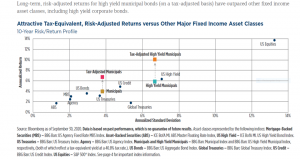Investment Options That Can Provide Diversification and Yield in a Low Interest Environment
Have you met stock investors’ new girlfriend TINA? She is the belle of the ball—an alluring and popular guest. Who is she? Her name is an acronym for “There Is No Alternative” to stocks. With real estate prices skyrocketing and interest rates (and therefore bond and CD rates) near all-time lows, investors are holding their noses at the markets’ high valuations and saying yes to TINA!
At FourThought we are constantly searching for alternatives that have the potential to produce returns not directly tied to the stock market; this is critically important for portfolio diversification. While bonds offered respectable yields for many years, today’s low interest rates are making them less attractive. Therefore, our team has worked to identify investments we think can “dance” with TINA and we are currently working with three options: high yield, tax free municipal bonds, MLP closed-end funds and private debt funds.
High Yield Municipal Bonds
High yield “munis” are bonds issued by state or local governments that are unrated by the major rating agencies or have credit ratings that are below investment grade.
Investors own high-yield munis because they offer higher income than their investment-grade counterparts—usually by a margin of about three percentage points—and they are tax-free on the federal level, and sometimes on the state and local levels as well. We like them for four reasons:
- They’re beautiful compared to other dancers, as demonstrated by this graph. On the vertical axis is return, while horizontal is risk. During the time period on the graph they provided attractive returns relative to other parts of the fixed
 income market, and we believe it will continue. Be aware that if you are in a low tax bracket the after-tax comparisons overstate the attractiveness.
income market, and we believe it will continue. Be aware that if you are in a low tax bracket the after-tax comparisons overstate the attractiveness. - While we don’t have a crystal ball, we are watching signs that indicate the Fed will keep the music playing. In fact, it has announced plan to keep rates low and is aggressively buying bonds make that happen. That is the main reason we don’t anticipate any spike in rates.
- We think Biden will turn up the volume with higher taxes. Higher taxes make tax free munis more attractive to investors on an after-tax basis. This could increase demand.
- The Biden administration has indicated it will sponsor the dancers. He is proposing a massive stimulus package that will focus, among other things, on supporting state and city governments so they in turn can fund first responders and schools. If passed, this stimulus will inject money into the very issuers who have low rated debt.
MLP Closed End Funds
MLP (master limited partnership) closed end funds are mutual funds—mostly in the energy or financial sectors—that trade on the New York Stock Exchange. Unlike regular (open end) funds, the number of shares are fixed. Therefore, if you want to buy shares you have to buy from a willing seller and vise-versa.
Lately, with the evaporation of demand for oil and gas due to COVID-19, there have been more investors wanting to sell these funds than buy them. In addition, the energy sectors’ performance has been one of the worst. This negative momentum has caused drops in share prices and investors tend to sell their losers at year end to capture tax losses.
All of this creates a situation in which fund prices are often substantially lower that their net assets. In other words, there is an opportunity to buy shares at a discount.
Why is this important? Our thesis (and the Fed’s projection) is that the economy will pick up in 2021, and it stands to reason that demand for oil and gas will rise again. Despite major gains in renewable energy sources our country still runs on oil and gas, and they must be transported from the source to users. The pipelines that crisscross our country are the most efficient way to do this.
Hopefully, investors who take advantage of the current MLP prices can later enjoy a gusher of income and potential price appreciation.
Private Distressed Debt and Real Estate
For investors with a higher level of risk tolerance, private debt and real estate may offer another alternative to bonds and other fixed income securities.
Because of the pandemic and other trends many hotels, entertainment facilities, commercial malls etc. are in deep financial trouble. A lot of the debt is on bank balance sheets and the balance sheets of non-traditional lenders. Expert, aligned investors have an opportunity to take advantage of this through a portfolio of carefully curated, private, distressed debt funds. Often holdings can be repurposed (for example converting a mall into an Amazon fulfillment center) or they simply will go bankrupt and a new organization with a much lower cost structure will reopen, which will happen with a lot of hotels and entertainment complexes.
It is important to remember that no one can dance forever, even if the music continues. And, it’s best to have more than one “dance partner.” You need the safety of bonds, but after inflation and taxes we find that we are losing ground. Quality, dividend equities should occupy the biggest space on your asset dance floor—but there is room for alternatives.
